 We started a free book giveaway yesterday, which prompted one of our team on the Zoom call (we don’t have an office – it helps keep costs down) to ask if free giveaways actually work. Which is a very good question. By the way, if you didn’t know about the free book, it just shows the value of signing up for our newsletter – but that’s another issue. We know that people like to get something for nothing, but that isn’t why we give away free books. No, we give books away in the hope that the enjoyment the readers get from it will encourage them to buy more books by the same author. But you knew that already. What you really want to know is if it works or not. Which is a very … sorry, we’ve said that once.  One of our authors One of our authors The answer is that there is no short answer. We can’t point our finger at the work of one of our authors and say “Because we gave away one of his books for free, we then sold more by him” (or her as the case may be). There are some people who do free book giveaways in order to generate lists of email addresses they can use for marketing - you have to email a certain address to get your free copy. We don't do that. We think it's a little bit underhand. When we do a free book giveaway it is always done through one of the etailing sites so that we don't know the email address of the beneficiary. Or we allow a direct download from this website, for which you don't have to provide an email address. (see our "Freestuff" tab to find out what's on offer) But to get back to the point, let’s take this from first principles. If you are trying to get people to buy more books by the same author, then it follows that they must have more than one book available. So, for first time authors, this isn’t going to do them much good. You may think that is stating the obvious, but it is amazing how many first-time authors do free giveaways in the hope of stimulating sales. Just goes to show how hope can delude people sometimes.  “But it will get my name noticed.” Some authors will reply. No, it won’t. Your name will only be noticed by people who take a free copy of your book. OK, they may come back for your next book, but you haven’t even published that yet, so by the time you do, your name will probably have been forgotten again. For authors who have multiple, but disparate, titles it is hard to see a connection between the sales of titles that have no connection to the one given away for free, ie books that are about different groups of characters, even if they are in the same genre. If you track your sales and there is a sudden surge of interest in some titles, then it does suggest that the free giveaway had some influence. But if the change in sales is less dramatic it could just mean that some new readers have discovered your books and it has nothing to do with the free giveaway. Indeed, the new readers may not even have read the free book and might buy it later if they like the ones they have bought.  It is in sales of books that are written as a series that we see the greatest effect of free giveaways. If it is Book 1 of the series that is given away (which is the sensible way of doing things) then we know that Books 2, 3 etc are probably going to increase their sales if the readers of Book 1 enjoyed it. So, if you are an author that writes a series, then this is something worthy of your consideration. What about books written as ‘tasters’ – stories that are less than full length books which are given away as an introduction to the series. These are usually a prequel, but they don’t have to be. 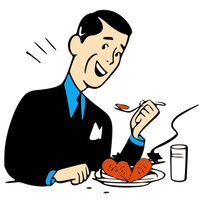 I have to say we have seen very little evidence that those justify the amount of work that is invested in them. If you know differently, then do get in touch and tell us. There are a couple of issues with tasters. The first is the amount of time they take to write. Every author has some idea of how long it takes them to write a full-length novel, but does writing a half-length ‘taster’ story take half the time? Does it take less, or does it take more? And we all know that Benjamin Franklyn said that “Time is money.” Are you going to generate enough sales of your taster to make it worth the investment of time that you have made in the writing of it? You hope you will, of course, but I’ve already mentioned how hope can delude us. 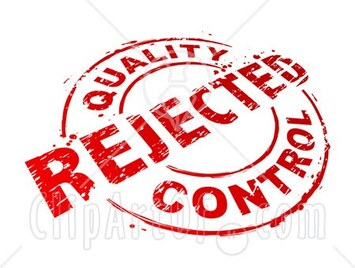 The other issue is quality. I have read some taster novels which are nowhere near as good as the books they seek to promote. Perhaps it’s a psychological thing and the author subconsciously doesn’t try so hard to write a good story for a work they know is going to be given away for free. And if the taster isn’t good enough, it isn’t going to encourage sales of the full price book. That doesn’t apply to all tasters, of course. I have also read some that are brilliant and a good advertisement for their product. It just isn’t a universal truth. But is it enough just to give the book away for free? Should you do more? Yes, you should. 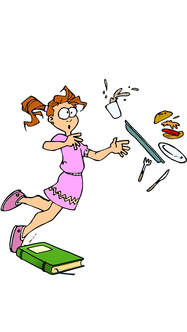 As with all books, readers aren’t going to stumble across your free book by accident. OK, most book etailing sites maintain lists of their free books, so your offering will appear there. But it isn’t the marketing channel you need to appear in. The sorts of readers who haunt the listings of free books are the sort who want to read, but don’t want to buy books. Yes, they’ll download your book because it is free, but there is a good chance they won’t come back and buy the ones they would have to pay for. They’ll be back browsing the lists of free books, looking for their next read No, you need to entice the book buying public, not the freebie lovers. And that means promoting the fact that you have a freebie on offer which they might consider looking at. Those are the readers who will buy Book2, 3 etc of the series. You may also get some reviews, which always help sales. So wherever and however you promote your books, that is where you also have to promote your free offer. You may even have to invest in advertising.  I know it sounds insane to spend money in order to give something away for free, but it does work. Thousands of businesses pay to advertise free and ‘buy-one-get-one-free’ offers and they wouldn’t spend the money if it didn’t work. You need to think of this as a long-term strategy. Yes, it may cost you £50 to run a Facebook advert for your free book, but if you get enough sales of the rest of the books in the series, the cost of that advert could be repaid many times over. So, for those of you who are considering doing a free giveaway, the key points to take away from this blog:
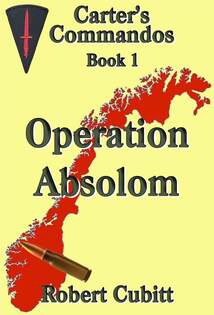 And if you are reading this before midnight on 31st October, you can still get “Operation Absolom” by Robert Cubitt for free. Just click the cover image to find out more. If you have enjoyed this blog or found it informative, why not sign up for our newsletter. At least, that way, you won't miss out on our next free offer. Just click on the button below.
0 Comments
 Many an “Indie” author will tell you that the hard part of being an author isn’t the writing of the book, no matter how hard that seemed at the time. No, the hard part is actually selling the book to readers. Let’s face it, it doesn’t matter how good the book is, if no one knows it exists then they can’t buy it. Readers rarely, if ever, just stumble across a new author’s work. It may occasionally appear on Amazon under the heading of ‘People who bought …. Also bought …..” but that is the equivalent of hoping to hit a fish by throwing a stone into the sea. OK, theoretically you could, but it’s unlikely you will.  Do not confuse marketing with advertising, because advertising is just a small part of the marketing mix which we will discuss later in this blog. It is covered under the P for promotion part of the mix, but even then it is quite a minor part. Back at the beginning of this year we published a series of blogs that discussed marketing in depth. If you want to read the whole series then look under February in the archive and scroll down to the bottom of the page to start at the beginning. Don’t be confused by the fact that the first blog is Week 5 – the first 4 weeks were looking at the dark arts of publishing. The series continues into March and April But before you go and look at the archive, we’re going to reprise some of the highlights of those blogs to give you a few things to think about. Call them the ‘key messages’.  We’ll start with the marketing mix – the 6 Ps. Some marketing blogs talk about the 4Ps, but we’re a bit like Spinal Tap, our Ps go all the way up to 6 (Younger readers may not get that reference). These are:
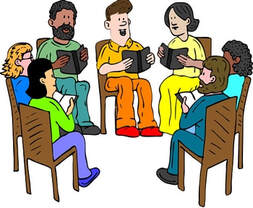 The most important P is people The most important P is people You might think that ’promotion’ is the most important part of the marketing mix, but it isn’t. It’s people. You can 'promote' your ‘product’ as much as you like, but if you aren’t reaching the right people, then you are wasting your time and, probably, your money. Your ‘people’ are the people who read books similar to the ones you write. They are the ones you need to identify and engage with on social media. I say ‘engage’, because if you just ‘promote’ you will lose their interest very quickly. Yes, you can promote, but only as a small part of engagement. You need people to want to follow you, which means having something interesting to say. And if you doubt that, consider this – you’re reading this blog, aren’t you? That is part of our ‘engagement’ with you. Maybe, as a consequence of our engagement, you might take a look at the ‘Books’ page of our website to see what we have to offer – or maybe you won’t. The choice is yours, but the important thing is that you are here, which makes the choice easier.  Paying companies to blast out Tweets about your book won’t get you sales -despite their promises of having a gazillion followers. Because only the Tweets (or other social media posts) that reach the sort of people that read your sort of books are of any use and only you can identify and engage with those people. Just as an aside – doing a #writerslift on Twitter isn’t engagement, it is just becoming increasingly annoying because so many people are doing those. And everyone in the list replying to it and filling up notification boxes is even more annoying. We’ve started blocking all the people who do it. We’ll assume from the start that your book is well written, has a good plot, interesting characters, has been properly edited, proofread and corrected. It is therefore fit for purpose. Only you and your Beta Readers can judge that. So that part of the next P, ‘product’, is OK. 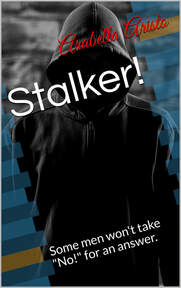 After that the most important part of the product is the cover. Despite the warning in the old proverb, people do judge books by their covers. So, yours must be right for your genre. The cover image is what is going to attract people’s attention, so it has to be eye catching and genre appropriate. A picture of a woman in a big bonnet walking through a field of daisies isn’t going to sell many sci-fi books. The second thing about the cover is that it should tell the reader a little bit about what is happening in between the covers. Call it a visual representation of the plot. A picture is worth a thousand words, or so they say, so make sure that the picture on your cover is using those thousand words to best effect. Here’s one of ours which, we think, tells you a lot about the plot. 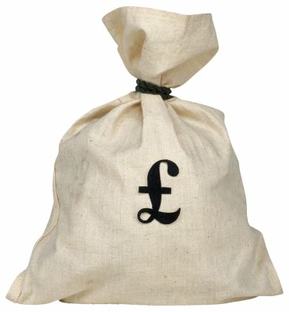 What about price? How much should you charge for your book? If you are a big-name author, you (or, more likely, your publisher) can get away with charging £12.99 ($14.99) for your book. If you are an unknown or Indie author, don’t even think about it. There is some interesting psychology related to pricing. On the one hand, people expect to pay more for a quality product. On the other hand, everyone loves a bargain, even readers. Where you pitch the price of your book is therefore important. Price it an 99p (99c) and readers may think ‘It can’t be very good if they’re practically giving it away’. On the other hand, price it at £12.99 and readers may say ‘I’m not going to pay that much to read a book by an author I’ve never heard of’. We price our ebooks at £4.99 ($5.99) and that seems to be about right for us. But the key messages are (a) don’t undersell yourself and (b) don’t price yourself out of the market.  When we talk about ‘place’ we mean the places where you promote your books rather than the places you sell them. We’re going to assume that your book is listed on all the relevant ebook etailing sites and, for those of you that don’t want to give money to Geoff Bezos, all we can say is that if you aren’t on Amazon, you aren’t anywhere. Internet searches always place Amazon at the top of the results, so if someone is actually trying to find your book, that is where it will appear first – and perhaps the only place on the first page of results. Amazon's Kindle Direct Publishing offshoot also allows you to publish in paperback without paying expensive set-up charges or buying a minimum number of copies. But in our terms, place means your choice of social media site(s) on which to engage with readers and promote your work and your choice is important.  If you want to reach young people, then Facebook isn’t the place and Twitter is iffy at best, because young people are always on the newest, trendiest platforms. Only 51% of social media users between ages 12 and 18 use Facebook – the second smallest group. So you need to do some basic research to make sure the platform(s) you are using are the right ones to reach your target audience. But don’t rely on social media alone. Local newspapers and radio stations are always looking for content, so a short item (written by you) will fill some column inches for them or an interview will fill five minutes of radio time. But, again, don’t expect them to find you. You have to reach out to them. Also, check your local community resources (libraries, schools, colleges churches, clubs, societies, etc) for events where you can go along and talk about your work (and maybe sell a few copies).  Promotion can be anything from a Tweet or Facebook post to a video, podcast, a free extract or paid for advertising. I don’t aim to cover all of those. Instead I’ll focus on the one that you have to pay for – advertising. Social media has given us all the ability to run relatively cheap advertising campaigns – but which ones work and which don’t? Ask us a question that we can answer. Because, again, it depends on the advertising channel you use. There is no point in paying for and advert on Facebook if hardly any of your target audience ever uses Facebook. We can tell you where we get the best return on our advertising budget – but that would be more confusing because we use different platforms for different books, because different audiences use different social media platforms. What we can tell you is that spending money on Amazon doesn’t seem to work for us. We don’t know why that is, but we have had very little success there. Other publishers and authors tell us that they have had significant success using Amazon, so we can’t explain it. But one important detail about advertising. Makes sure your advert includes the following:
 You’re now wondering what I’m going to say about ‘process’. Actually, not a lot. I’ve tried to get the messages in this blog in the order you need to address them. That’s about all the ‘process’ you need to worry about. But if you want to be successful your ‘process’ must also include research:
 Without that research, you may as well be standing on a street corner shouting ‘buy my book’. And you will be no more successful. And, if doing research sounds like too much hassle, then good luck getting people to stumble across your book by chance. If you have found this blog informative or entertaining (or both) then make sure not to miss future editions by signing up for our newsletter. Just click on the button below. 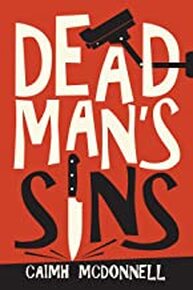 It is fair to say that I am a fan of the work of Caimh (pronounced Keeve) McDonnell. I have never made a secret of it. I won’t rest easy until his books are being read by the whole of the British and Irish reading public and a fair few other nationalities in the English speaking world (apologies to the Irish who speak Gaelic as their first language). It therefore gives me great pleasure to review “Dead Man’s Sins” and award it five stars. It isn’t the plot that makes this book so enjoyable. It is OK, it gets the job done and all that. No, it’s the dialogue.  In places the dialogue is so authentic and humorous that you feel you are listening into a conversation in a Dublin pub. It is the personification of “the craic” and you can almost smell the Guinness fumes rolling off the page (or through the screen of your e-reader). I would give you a few extracts to demonstrate what I mean but, taken out of context, they would be meaningless. Believe me, I tried, but I had to delete them because they didn’t give me the delight they did when they were part of the book. So I guess you’ll just have to trust me. 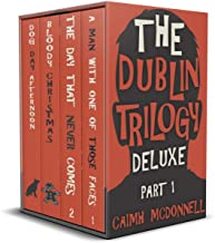 Caimh McDonnell started off writing “The Dublin Trilogy” a few years ago and the series now contains so many books that the word “trilogy” has been rather bent out of shape. There is also a spin off series set in New York, but I won’t go into that here, even though it does feature the main character from this book, which is set before he departs for the Big Apple. “Dead Man’s Sins” is book 5 of The Dublin Trilogy and is also a sequel to “Angels in the Moonlight”, which is book 3, but is set several years before books 1 and 2. And “Dead Man’s Sins” came out after Book 4, which is set after Book 2. Look, if you managed to deal with Star Wars episodes 1 to 3 being screened after episodes 4 to 6 but before episodes 7 to 9, you’ll get past this, OK!  The author - Caimh McDonnell The author - Caimh McDonnell Don’t worry if you haven’t read the earlier books. The plot of this one stands up well enough on its own and you’ll get the essence of the main character quite quickly. Which brings me to the protagonist for the book, Detective Bernard ‘Bunny’ McGarry, pride of the Garda Siochana. That’s the police, fuzz or cops to anyone born outside of Ireland. Bunny’s policing style is unconventional, to say the least but he gets results and that’s what counts. The story opens with Bunny unwillingly taking a sabbatical from the police. He receives what amounts to a distress call from the elderly mother of his dead partner (in the “colleague” sense of that word) ‘Gringo’ Spain. The elderly Mrs Spain is about to be evicted from her home by a rather nasty Dublin loan shark and, out of a sense of duty towards his dead partner, Bunny feels obliged to intervene. Bunny goes to see the loan shark, Coop Hannity, argues with him, threatens him, steals a garden gnome and departs. Unfortunately, the whole incident is captured on Hannity’s CCTV security system, the quality of which would make MI5 jealous. Why unfortunately? Because the next night Hannity gets stabbed to death. But it is the dialogue that made this book for me. So now Bunny must find out who killed Hannity or risk becoming ‘prime suspect’ himself. To help matters along, the detective assigned to lead the murder hunt is an old adversary of Bunny’s, who would love nothing more than to bang his old enemy up for the crime. From there the plot ticks along nicely, with enough incident to keep the pages turning. It is fair to say that this book is on the lighter end of the crime novel spectrum, as are all the Dublin Trilogy books, so if you want something heavier, stick with Ruth Rendell and Ian Rankin. But it is the dialogue that made this book for me. In parts it is so sublime it is a thing of beauty in itself. It provides most of the humour and all of the charm. I have been saying for years that these books would make a great TV series and it is dialogue like that which would come across so well on screen. I highly recommend “Dead Man’s Sins” I have only one flaw to comment on. The author leaves a loose end unresolved, which was a bit frustrating. It isn’t related to the central plot, but it left me asking “why didn’t he tell us who did…well whatever it was that they did ... and why?” There was a particular point made during the incident which suggested deeper skulduggery but was left unexplained. However, it wasn’t a big enough deal for me to downgrade my 5 star rating for this book. For fans of Irish humour, Irish crime drama or for readers who want to try something new and very entertaining, I highly recommend “Dead Man’s Sins” by Caimh McDonnell. To find out more about the book, just click on the cover image at the top of this blog. And if you would like to become a guest reviewer for the Selfishgenie blog, just go to the contacts page to communicate with us. There are just three rules:
If you have enjoyed this blog, found it entertaining or informative (or all three) then be sure not to miss future editions by signing up for our newsletter. Just click the button below.  Authors have a bit of a love-hate relationship with reviews. We all want them, because we know that reviews help to sell our books. But we don’t want the bad reviews, because they have the opposite effect, or so we believe. But the one thing an author can’t predict, is how any reader will view their work. No matter how good your book is, there is almost certainly going to be someone who doesn’t like it. Regular readers of this blog will recall the one where we noted Oscar Wilde’s less-than-charitable views on Dickens’ book “The Old Curiosity Shop” and Dickens was considered to be a giant of the Victorian literary world. 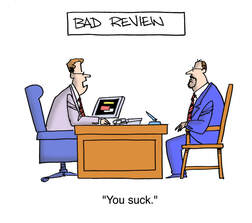 That’s the problem with reviews, we have no control over them. But a bad review can serve a purpose for an author. If we can identify what the reader didn’t like about our book, we can make sure we don’t do the same thing next time. After all, the definition of insanity is doing the same thing over and over and expecting a different result, so bad reviews provide learning opportunities. And if you are the sort of author that thinks they have nothing to learn from readers, you are probably doomed to get bad reviews forever. As a reader I do take a look at reviews, but I don’t actually read that many of them. You may think that is a bit odd, to look at them but not read them, but there is method in my madness. I mainly look at the split between the good reviews and the bad ones. If there are more good reviews than bad, then I’ll probably give the book a chance.  I do sometimes look at the bad reviews, to find out why the readers didn’t like the book. But I am very selective about the ones to which I pay attention. If a bad review is well written, in good English and provides valid reasons for why the reader didn’t like the book, then I’ll take it seriously. But if the bad review is just a short sentence which is mainly abuse, or if it’s written in a style that's the internet equivalent of a blunt crayon, then I don't take it seriously. I started using this method a few years ago, after reading hotel reviews on TripAdvisor. If someone has given a hotel a bad review, when everyone else seemed to be fine with it, then there has to be a valid reason (or so I thought). 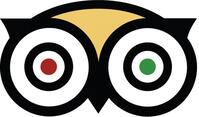 I’ll give you an example. We were going to visit Crete and wanted a nice hotel, but at a budget price. I found one that seemed to fit the bill and started reading the reviews. Most people were very positive about the hotel, but there were a few one-star reviews, which worried me a little. So I looked at one of them. The author of the review complained bitterly about a road running between the hotel and the beach. Apparently, the hotel’s website hadn’t mentioned it and he thought that he should have been told about it, as the hotel was listed as “beachfront”.  Well, we booked that hotel anyway, because both the location and price were right. And the road? Well, we expected to find a six-lane superhighway with cars whizzing up and down all day and all night at 100 mph. What we found was a very narrow road used to service the beachfront hotels and the number of vehicles using it each hour could probably be counted using the fingers of one hand. And they were being driven with caution. It took three paces to cross it (I counted them) and there we were, on the beach. So how was the hotel otherwise? It was OK. Actually, it was more than OK. We had a very nice week, ate some good food (OK, it wasn’t Michelin star standard, but it was tasty and plentiful) and drank some nice wine and all within our budget. We were happy to post a 4-star review after we got home. And that’s why reviews have to be treated with caution, especially the bad ones. People get upset about the strangest things and they take it out on whoever is handy. In the case of TripAdvisor, it’s the poor hotel owners who bear the brunt and in the case of books it’s the author of the book they just read. 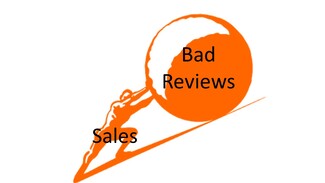 So, if you are an author and you get the odd bad review, please remember that you can’t please everyone. And if you are a reader, please remember that if the majority of other readers thought a book was worth four or five stars, then it is probably worth giving it a go. And if you are a reader who is going to post a bad review, please make sure that the standard of English you use is at least as good as that of the author you are about to criticise. It also helps considerably to say why you didn’t like the book. You will have your reasons, and the whole purpose of the review system is to share those reasons with others. Is there a “good way” of writing a book review? Author Luisa Plaja offers this advice.  Write a couple of sentences telling the reader what the book is about. Keep it short and simple; this shouldn’t become a synopsis of the book. For those readers familiar with the term “elevator pitch”, think about it like that. Tell the readers what you liked about the book. Even the worst books have some redeeming features, so make sure you write about those. After all, the author deserves praise for giving you the things you enjoy.  Tell the readers what you didn’t like about the book. This is the justification for awarding anything below 5 stars for the review. Even if you still award 5 stars, there may be something that you didn’t like, even if it was only a minor flaw. Be quite specific about what you did and didn’t like. Was it a character? Was it something in the plot? Was it the author’s use of language? Focus on why you didn’t like whatever it was, because that is what people always want to know. Whatever it was, the author may benefit from your insights and they can then correct the issue in their next book – which means you get to read better books. Obviously, the balance between the lengths of the paragraphs describing what you liked and what you didn’t like should reflect how you felt about the book as a whole. If you liked the book, then the “good” paragraph will be far longer than the “bad” paragraph.  Summarise your review with your overall impressions. If you are mainly positive, then your summary should also be positive and vice versa. But don’t just repeat the previous paragraphs. Although Luisa Pelja doesn’t mention it, we think it is helpful to mention the genre of the book up front. After all, readers don’t want to waste their time reading a review of a book they are unlikely to buy because it isn’t in their preferred genre. Here at Selfishgenie, we also make our recommendations clear: yes, definitely read this book if you like this sort of thing, or no, steer well clear. Is there anything a reader shouldn’t put in a review. Luisa Pelja doesn’t offer any advice on that, so we will.  Don’t be abusive. First of all, the author didn’t set out to write a bad book so they shouldn’t be abused for trying their best. Secondly, your opinion of the book is just that: an opinion. It isn’t a fact. Abuse isn’t constructive – it’s destructive. There is no beauty in destruction. Finally, abuse tells the world more about the abuser than the abused. The book reviews we publish on our website mainly conform to the format described by Luisa Peljac, but we do go further. That is because our reviews are also blogs. They are intended to go further than just looking at the book; they also provide information about the author, what sort of people may enjoy the book and maybe a few homespun stories about how the reviewer stumbled across the book in the first place. But for reviews that are posted on Amazon, Goodreads etc we stick to the basic format described above. And finally, if you have enjoyed this blog, found it entertaining or informative (or maybe all of those), be sure not to miss the next edition by signing up for our newsletter. We promise not to spam you. Just click the button.  If you are with someone who gets bitten by a snake, what do you do to help them? If you are thinking “I cut the wound and suck out the poison” then you are wrong and the person who was bitten will probably die. Such is the power of Hollywood movies that millions of movie goers have grown up thinking that, in an emergency, that’s the way you treat a snake bite. In a similar vein (pun intended), you may think that the way to get rid of leeches is to burn them off with a cigarette end. I’ll give the correct methods for dealing with both those things at the end of the blog if you want to stick around, but the point I’m making is about research and why it is so important for authors to do it properly, rather than relying on what they think they know – because they may be wrong. 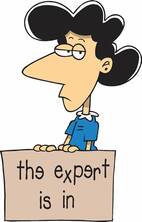 Many readers follow a particular genre of books because they have an interest in the subject the author is writing about. People interested in the “Old West” will read westerns, people who are interested in history will read historical fiction, usually focusing on a particular period. And, let’s face it, with so much crime drama on TV, everyone thinks they know about the law these days. But because those readers have an interest in those things, they tend to be quite knowledgeable - which makes life difficult for the author. If your reader knows as much, or more, about the subject than the author knows, then the author quickly loses credibility if they get stuff wrong. And if the author loses credibility, they lose the reader. They may also get an adverse review for their book, which will affect future sales. Which is why research is so important.  We have received submissions from authors where the research has been poor or non-existent and when we have provided feedback on that, they have responded by pretty much saying “research is for losers”. OK, they may not have used those precise words, but that was the tone of the message. Or they have pointed us in the direction of the TV show or movie from which they got their information. Which brings us back to snake bites and leaches. TV shows and movies are produced for the purposes of entertainment. Some have high production values and take care to get their facts right. Some just want to get a story onto the screen and aren’t bothered about the facts. Sadly, it’s the latter that seem to work their way into the brain. 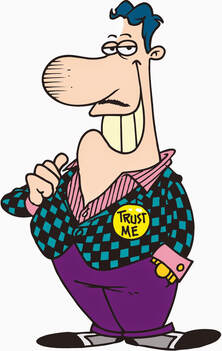 If you are an author that wants to be regarded as credible, then taking care about facts is important. You are taking the reader on a journey in which you will make your characters do some incredible things. Some of those things may not be possible in real terms, but you want you readers to believe they are. Which means that they should trust you and the way you get them to trust you is by getting the real stuff right; the stuff the readers know about already. And if you have to stretch the truth in order to make a story work then it is good manners, at least, to tell the reader that you have stretched the truth and in what ways you did it. For example, if you have mentioned an historical battle and placed it in the same year as you have set your story, when in fact it was a year or two earlier or later, then tell your readers that and tell them why you did it. They will respect you for your honesty and, more importantly, they won’t embarrass themselves in the pub when they argue about it with their pals.  So, what is research? One dictionary gives the definition as “the systematic investigation into and study of materials and sources in order to establish facts and reach new conclusions.” Note the use of the word “systematic” in the definition. You have to know what you are looking for and that directs you to the places where you will find it. Asking the right questions is always a good start. 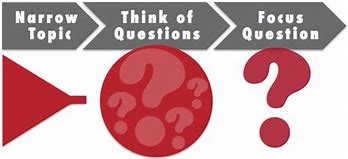 Research methodology Research methodology For authors this means asking questions about the people, places, events, dates, times, artefacts, fashions, technology, science, theories, outcomes and a whole lot more, depending on the genre in which the author writes. What isn’t research? We’ve already mentioned TV and movies (though factual programmes can be helpful) but it also isn’t using the internet. That is a useful tool, but it is littered with inaccuracies and if you aren’t an expert yourself, you may end up repeating someone else’s errors.  Comedian Dave Gorman Comedian Dave Gorman I’ll give you an example. The Wikipedia page for British comedian Dave Gorman stated that he had achieved a certain feat on a bicycle (he is a keen cyclist). It even showed an image of him in full lycra (spandex for our American readers), standing next to his bike. He hadn’t achieved that feat, something to which he freely admitted. The citation that backed up the statement was for a small circulation local newspaper that had got its facts wrong. Gorman told Wikipedia that and they removed the offending reference. A week later it was back in again, with the same citation, because the person who had edited the article claimed that the newspaper article was correct and Gorman was wrong. Yes, the person who knew what he had and hadn’t done was deemed to be the one in error. And that’s the internet for you.  So, what research do you do? No matter what the subject, someone will have written a book about it. In all probability there will be more than one book. So that’s where you start. Reading more than one book on a subject gives the author several things:
Yes, reading books is time consuming. But better to take a bit of time and get a better book, than take short cuts then get bad reviews because you’ve got your facts wrong.  Interview witnesses Interview witnesses If events are more recent and there are living witnesses, then research is interviewing them. Witnesses add real texture to a story and turn dusty old facts into reality. Even better, they can add an emotional depth to events. This approach also works with getting information from experts. Talk to doctors, police officers, lawyers, scientists, soldiers etc to find out what really happens behind the scenes. This is especially important when it comes to procedural issues. These experts can also explain things in simpler terms than some of the books on the subject. All those people can also tell stories of their own experiences, which can be woven into the author’s plot. Of course, interviewing people takes time, but with modern technology it can often be done without leaving the house. At least make the effort.  Visit locations Visit locations Finally, visit the real locations and study the places where events happened, or where you want them to happen in your plot. It is quite clear that Dan Brown had never actually visited Rome before he wrote “Angels and Demons” and that is very apparent to people like me who have been there and then threw the book across the room in disgust at him getting so much wrong. Yes, location visits are expensive, but they are also tax deductible. *  The last resort The last resort Only if you are completely unable to do any of the above should you rely on the internet and even then you should read as many sources as possible to make sure that you aren’t being misled. There are many websites that actually hold first-hand accounts of events and extracts from other reliable sources. Wikipedia may be good for a quick overview of a subject, but don’t rely on it for some of the detail (see above re Dave Gorman). And never rely on TV shows or movies. So, now that I’ve exhausted the subject of research, how do you deal with snake bites and leaches? Snake bite. Remove jewellery or watches from the affected limb, in case the injured area swells up and cuts off the blood supply. Keep the wound below the heart to slow the circulation. Seek medical help immediately. It helps to be able to identify the type of snake, but don’t take any further risks in doing so. By the way, the reason cutting the wound and sucking doesn't work is (a) because the poison spreads too quickly and (b) any poison that is sucked out will only be a fraction of what was injected. Removing leaches. The best thing to do is to let them drink their fill. Once they finish feeding, they will just drop off (it takes about half an hour). If you don’t want to wait, then identify the head and apply pressure on either side by sliding the thumbs gently towards the head. The head should pop out and the leach can be lifted off. Burning the leach with a cigarette will work, but it runs the risk of burning the skin, which can then become infected, which will cause way more harm than the leach. Yes, we did research those answers before posting them. * This doesn’t mean that authors can take a holiday and then deduct it for tax purposes. There must (a) be a published book resulting from the trip and (b) only the proportion of the trip that was actually spent doing research can be deducted, not the time spent lying on a sun bed. Incidentally, the cost of books and travel to undertake interviews is also tax deductible. If you have enjoyed this blog or found it information, and want to make sure you don't miss future editions, why not sign up for our newsletter? Just click the button. |
AuthorThis blog is compiled and curated by the Selfishgenie publishing team. Archives
June 2025
|

 RSS Feed
RSS Feed